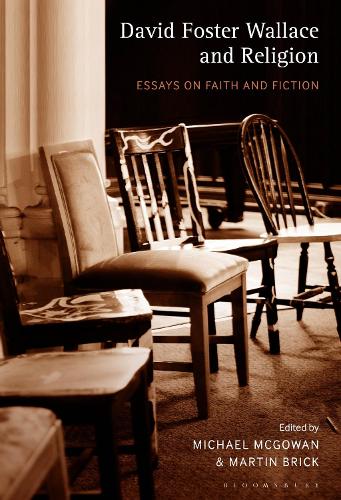
David Foster Wallace and Religion: Essays on Faith and Fiction
(Paperback)
Publishing Details
David Foster Wallace and Religion: Essays on Faith and Fiction
By (Author) Dr Michael McGowan
Edited by Dr Martin Brick
Bloomsbury Publishing PLC
Bloomsbury Academic USA
20th May 2021
United States
Classifications
Professional and Scholarly
Non Fiction
Literary studies: c 1900 to c 2000
813.54
Physical Properties
Paperback
224
Width 152mm, Height 229mm
308g
Description
In the years since his suicide, scholars have explored David Foster Wallaces writing in transdisciplinary ways. This is the first book of its kind to discuss how Wallace understood and wrote about religion. At present, the scholarly community is sharply divided on how best to read Wallace on religious questions. Some interpret him to be a Nietzschean nihilist, while others see in him a profoundly spiritual, even mystical thinker. Some read Wallace as a Buddhist thinker, and others as a Christian existentialist. Involved at every level of this discussion are Wallaces experiences in Twelve Step recovery programs, according to which only a higher power can help one remove unwanted defects of character. The multifarious essays in this volume by literature, religion, and philosophy scholars in the Wallace community delve into Wallaces life and writings to advance the conversation about Wallace and religion. While they may disagree with one another in substantial ways, the contributors argue that Wallace was not only deliberate in his writings on religious themes, but also displayed an impressive level of theological nuance.
Reviews
David Foster Wallace (19622008) was bored by religion. That he eventually hanged himself speaks to either his lack of concern about the afterlife or severe mental illness, or perhaps both. Wallace's readers find much evidence of spirituality in his work, particularly in Infinite Jest, his grand book, which throughout refers to AA, Wallaces spiritual guide. In his talks and throughout his writing, Wallace took the philosophical view that those who worship stuff, money, or sex will eventually come up empty, but those who worship a higher power will find themselves with something real. Wallace was forced into AA in a halfway house, but he continued to participate through much of his life. And through his study of philosophy he developed the idea that humans, as humans, must have a God to ask for helpbecause they cannot help themselves. This is a conversation with Christianity one rarely sees from deep intellectuals, other than Marilynne Robinson, and the subject has been given too little attention in Wallace's work. Summing Up: Recommended. * CHOICE *
Wallace's work is deeply attuned to the pain of being human. And, like any good nun or bodhisattva, he is especially attuned to the exquisite, self-imposed forms of suffering that we wreck upon ourselves in the privacy of our own heads. While Wallace's tentative responses to this suffering never quite invoke God, this collection clearly demonstrates that the questions he's perpetually posing couldn't be more religious. * Adam S. Miller, Professor of Philosophy, Collin College, USA, and author of The Gospel According to David Foster Wallace (2016) *
Drawing on the thought of a range of theologians, archival research, biography, and astute literary criticism, the essays in this collection initiate a vibrant and vital conversation on spirituality in Wallaces life and work. * Robert L. McLaughlin, Professor of English, Illinois State University, USA *
These are valuable essays, several of them especially rich in their examination of Wallace's archive, correspondence, and intertexts. Wallace restlessly combined theology, philosophy, mysticism, and an uncanny understanding of human awareness to create hybrid religious experiences for his characters. This collection bears compelling witness to his quest. * Jeffrey Severs, Associate Professor of English, The University of British Columbia, Canada, and author of David Foster Wallace's Balancing Books: Fictions of Value (2017) *
If it's possible to be a reluctant spiritual writer, David Foster Wallace might fit the bill. His work has been received as veritable instructions for living. This collection of essays does justice to the existential import of Wallace's oeuvre without co-opting him for a religious commitment he never made. The book exhibits a remarkable range of attention and sensibility. * James K.A. Smith, Professor of Philosophy, Calvin University, USA, and author of You Are What You Love: The Spiritual Power of Habit (2016) and On the Road with Saint Augustine: A Real-World Spirituality for Restless Hearts (2019) *
Anyone interested in questions about interpretive strategies and what might count as evidence for a particular interpretation of a written work (fictional or nonfictional) will appreciate this collection. * Reading Religion *
Author Bio
Michael McGowan is Professor of Philosophy and Religion at Florida Southwestern State College, USA. He is the author of The Bridge: Revelation and Its Implications (2015). Martin Brick is Associate Professor of English at Ohio Dominican University, USA.
